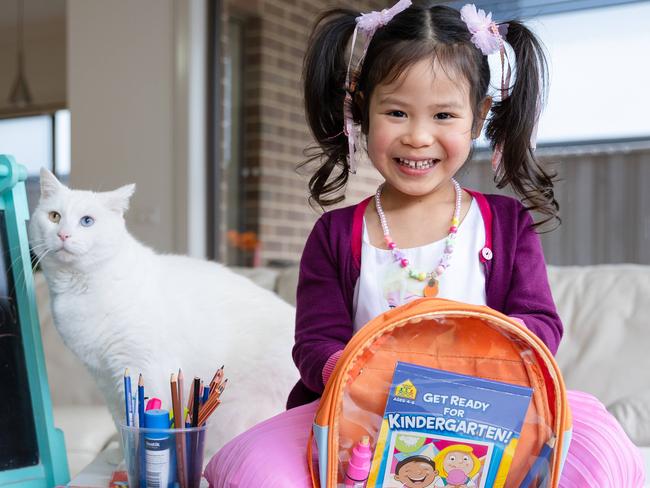Psychologist reveals 2 per cent of kids can achieve IQ requirement of 130 for early entry into prep
Parents are calling for more flexibility regarding the Department of Education’s prep minimum age exemption rules, with one psychologist saying not many kids can pass a core requirement.
Early Education
Don't miss out on the headlines from Early Education. Followed categories will be added to My News.
Victorian parents are calling on the government to relax minimum age requirements and let their children start prep earlier, with one psychologist saying only two per cent of kids born after the cut-off date will meet a core requirement.
Victoria has the earliest cut-off dates for students starting prep compared to nearly all states, with children required to turn five before April 30 if their parents want to enrol them into school that year.
Parents who want to enrol their child with a fifth birthday after the cut-off date are required to apply for a minimum age exemption, which requires their child to have an IQ of 130 as evidence they possess suitable academic ability, among other criteria.

But psychologist Adina Kotler, who conducts cognitive and achievement assessments, said roughly two per cent of children will score an IQ of 130 or above.
“The WPPSI-IV (form of IQ test) assesses a child’s performance relative to others their age on tasks assessing reasoning and problem solving, language skills, working memory, and speed of processing or working through simple visual information,” she said.
“IQ results tend to become more reliable as children get older, so an IQ result is best thought of as a ‘snapshot’ of a child’s performance at a point in time.”
Ms Kotler said an IQ that falls between 90-110 is within the “average range” for a four-year-old while scores of 110-120 are considered “high average”.
“A child’s capacity to learn new information is something that is very important when considering early school entry but a child’s performance in each area of thinking assessed needs to be taken into account,” she said.
“Similarly, a child who achieves a full scale IQ of 130 and one who achieves a full scale IQ of 128 will be basically at the same level in regard to their learning capacity.”
But for five-year-old Matilda, whose birthday was four days past the cut-off date, an IQ of 128 wasn’t enough for the Department of Education to let her start school early.
“The psychologist said she was bloody amazing and was absolutely ready to go to school, as not only her learning ability but her emotional intelligence was very high,” Matilda’s mum Courtney McManus said.
“He said it would be absolutely detrimental that she go to school … but the Department said because her IQ wasn’t 130, she wouldn’t be accepted.”

Consequently, Matilda had to repeat four-year-old kinder and is now “rebelling” because she’s bored.
“If she was born four days earlier and had learning difficulties, she would have been welcomed with open arms but because she was born later, she was completely shut down,” Ms McManus said.
Meanwhile, father Edward Ho is looking for a second job after his daughter Eloise was accepted into prep at an independent school next year.
Her early entry application into a public schoolwas rejected because she scored an IQ of 122, and was born three weeks past the cut-off date.
The Department’s cut-off date doesn’t apply to private schools, with enrolment policies different for each school or sometimes up to the principal’s discretion.
Elsewhere, children can start school if they turn five on or before July 31 that year in New South Wales, while the cut-off date in Queensland and Western Australia in June 30.
In South Australia, children who turn five before May 1 can start in term one, while those who have their fifth birthday between May 1 and October 31 can start school in term three.
Tasmania is the only state with a cut-off date earlier than Victoria.
A Department of Education spokesman said: “We have in place long-standing arrangements that have broad support from schools and the community, and ensure the vast majority of children are able to go through school with their like-age cohort”.
The Victorian Government’s school enrolment policy is publicly available on its website.





